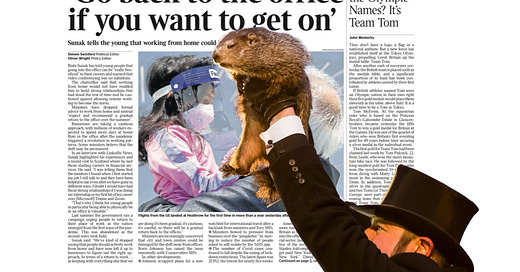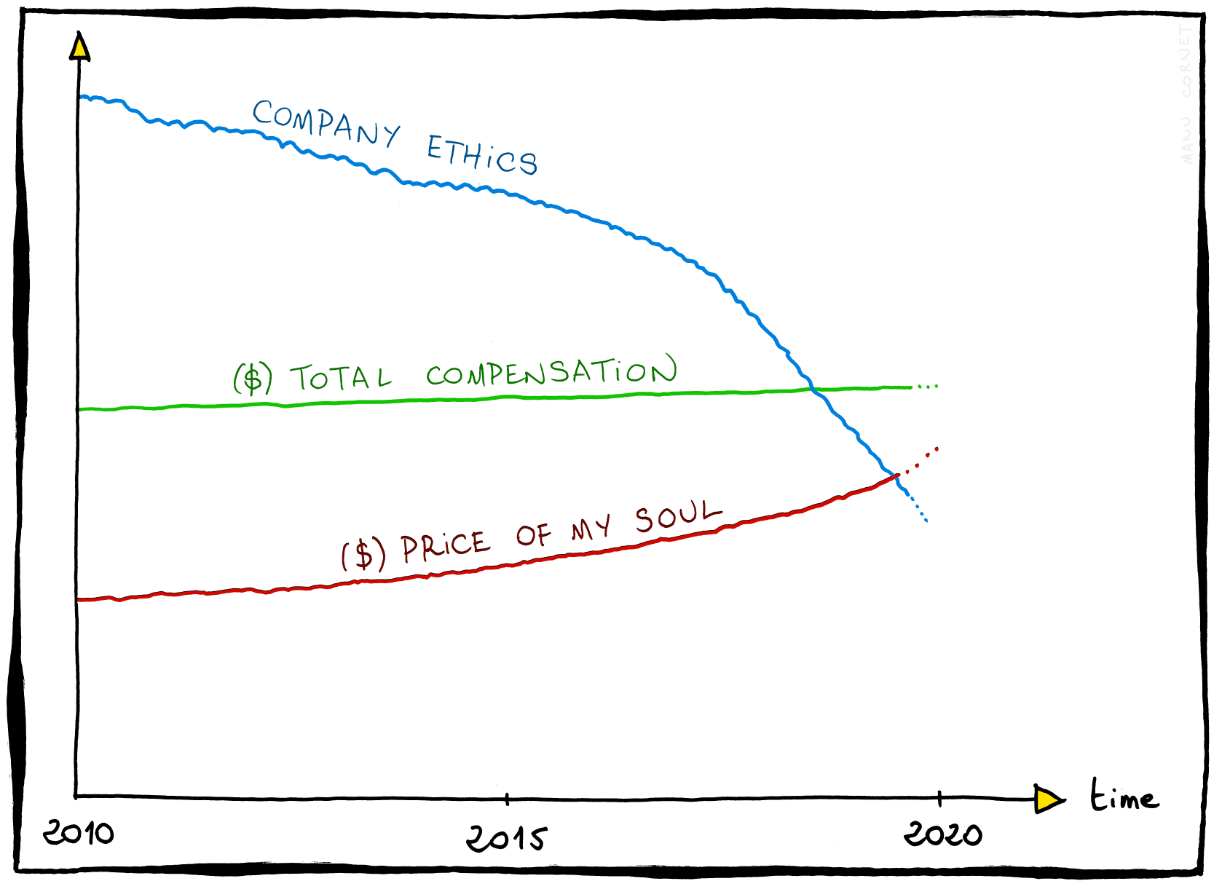Astonishing to see Rishi Sunak telling workers to back to the office today if they want to get on. Haven’t we been through this loop two or three times before? Fear seems to be the worst sort of motivation.
Values making a comeback
I was on a Zoom call recently with someone the likes of whom you’ve probably met in some capacity in the last year. A boorish extrovert in his late 40s who had used his love of the pub as substitute for a workplace personality, he scolded me that I consistently endorsed a version of work that was misguided, that I missed the motivation that ‘came from having daily banter in the office’.
Far from it, I couldn’t be more convinced of the power of shared bonds in teams, a collective identity driving discretionary extra effort from team members. Unarguably when something personally matters to us, we strive harder to make it succeed. (Wharton’s Sigale Barside is just one of the researchers who has produced evidence to support this) And we make things matter to us by forging a closer personal connection with the people we’re doing them with. My issue is that anyone who believes that the way to achieve that bond is unchanged is deluded, rooted in their own prejudices and closing their mind to how attitudes are rapidly changing. Lifelong office enthusiasts have found themselves charmed by their ability to get work done differently and have embraced the idea of blended working in the future.
I’m reminded of the podcast discussion I had with Andrew Barnes, CEO of an Australian firm that shifted to a 4-day week to increase productivity. A small portion of (generally male) employees didn’t tell their partners they were now free on Fridays - they used the extra time to do leisure activities and have long, boozy lunches. These are generational relics of behaviour, that younger workers (and lots of workers of the same age) will find baffling. Thinking that these are a trend is an error, these are blips in the data. (Don’t get me wrong: no doubt for the people concerned they are joyous blips).
But here’s where the best firms will be focussed for the second half of the year, they will be obsessed with how they can build strong cultures when the team isn’t always together. This involves a shift from companies being fixated with control to becoming firms who are fixated with culture. Ben Horowitz, founder of Andreessen Horowitz a VC firm that invested early in lots of apps on your homescreen, reminds us that ‘culture is ‘how people behave when no one is looking’. In the era of remote working this has never been more relevant. It’s why we’re about to see a resurgence of the importance of something that had drifted from popularity over the last few years, company values and behaviours.
There are plenty of firms who don’t have strong cultures. The way these organisations seek to deliver their products is often to use rules, policies and targets on everything. Europeans who go to work in US firms are often astonished with the amount of mandated process and bureaucracy - to a large extent these are elements of controlling scaled organisations. Management by bureaucracy can maintain a minimum standard of work and if your end product is good enough if can make for a profitable business. But it is exhausting to work in those environments. The alternative is to try to create a strong culture that guides behaviours when no one is watching.
In the last few years corporate values had become jaded, over-used devices that had ceased to be relevant to the cultures they were intended to define. For many firms their values had become a laundry list of adjectives that could have easily have been appropriated by their rivals. More cultures were being quietly defined by behaviours. There’s a saying in the US military that if you see something is low standard and you do nothing, you’ve just set a new standard. Your culture was defined by the behaviour of the people you hired, and what they did. Horowitz says in a company culture, if you see something off culture and you ignore it, you’ve just created a new culture.
I’m no rugby fan but I’ve been struck by the way that the New Zealand team used values to help propel them to unparallelled success. While their rules (like ‘no dickheads’) were explanatory symbols of what they stood for one of their defining values is ‘sweep the sheds’ - at the end of every match one of the senior players will sweep the dressing room. The room used by the All Blacks should look the same after it has been used as it looked before they arrived - the message is clear, no one looks after the All Blacks, the All Blacks look after ourselves. With that simple value is a clear message of self-dependence, the rejection of vanities or entitlements, a humble act of servant leadership.
As we move to a period of work that is defined by the way that workers are motivated when they aren’t listening to the pub-dwelling boss telling jokes in the office, values are due a comeback. The challenge for firms will be how to make these things make a genuine difference.
Read along in August
In the spirit of revisiting our understanding of company values and behaviours I’d love you to read along with us in August*. Firstly I’ll be reading Legacy by James Kerr and I’ll be talking to James on a podcast in two weeks. I’ve no understanding of rugby but I’m intrigued with how any organisation can achieve consistent success by a focus on values. Sport fan or not, there’s something in this one for everyone.
Secondly I’ll be reading Ben Horowitz’ What You Do Is Who You Are. Despite me trying exceptionally hard via multiple routes to get to speak to Ben it looks unlikely the billionaire investor is going to chat to me, however I will be doing a podcast on the book. If you read the book before 23rd August and have an opinion either send a voicenote in a reply to this email or just hit reply and type your thoughts.
Public service announcement: for those who find reading a touch of a chore I can recommend both books as audiobooks (as I’d done both in paper and audio).
The best companies are going to use the next six months to transform their culture through a focus on values and behaviours - join the discussion on these things.
LinkedIn have said ‘individual managers will decide if teams will ever return to the office’ (very consistent with our discussion last newsletter)
Another reminder of the evidence that the human brain is only really optimised for four hours of hard work a day (link fixed)
Been predicted for a long-time but at least it’s starting to become clear that the commercial property market is going to be decimated - the New York Times says almost a fifth of Manhattan offices are empty - no doubt with similar numbers in UK - I’ve already spoken to one housing organisation in the UK looking to flip offices to homes. Still in New York, landlords are worried that lots of new residential units are coming online and rents are almost certain to fall
A recruiter for games firm Activision Blizzard sexually propositioned a female candidate at a careers fair - and female employees at the firm staged a protest against the Frat Boy culture at the place
“We love central London, we would happily move there. We just don’t want to commute there every day” - how the end of commuting has transformed commuter towns
Three Netflix employees were fired after complaining about colleagues on Slack (reminder: Slack isn’t private by default)
There’s a growing consensus that firms who insist workers go back to the office full-time are going to see an exodus of their best employees (I’ve been talking about this market effect for a long while). Here are some articles that re-affirm this, Natwest CEO recognises the world has changed, here’s a Stanford professor saying 'remote work is the new signing-on bonus’ (ie an incentive to bring the best employees into your firm)
Brilliant article about a Google employee who took to drawing cartoons about the realities of the job. He said about 10% of Google employees subscribed to receive them as an email (see one below).
Will Delta mean change for firms? Lots of multinational firms are announcing pullbacks from the return to the offices with the arrival of the Delta variant. Google, Facebook, Uber and lots more. Other companies have said only fully vaccinated workers will be welcomed back to the workplace (Disney, Walmart amongst them).
Beware recruiting algorithms promising magic
AI is all around us right now, there are a lot of software firms starting to pitch machine learning products and solutions to workplace issues - recruitment is one hot area of innovation, for example.
MIT Technology Review performed a review of some of the latest artificial intelligence recruiting tools that are coming to the market (btw, I also reviewed one of these products a couple of years ago for the podcast, it said I was a crumby candidate). In the MIT review one candidate replied to all of the AI’s questions by reading a German wikipedia page and was awarded 6 out 9 for English competency. They took the German wiki page to another product and was declared to be a great match for the role. In analysis it seemed that the software was merely reading voice intonation for confidence and the content was ignored.
Along these lines former podcast guest Ben Waber, boss of Humanyze, tweeted last week about how some start-ups are promising their software will read people’s emotions. As he noted his concern that biases would creep into these systems, these products are often created by tone-deaf entrepreneurs who don’t trouble themselves with the unintended consequences of the value judgments in their code. As MIT Tech Review concluded there’s plenty of room for caution on the overpromise of AI tools - buy these products at your peril.
* Disclosure: I make a tiny commission if you click and buy books on these links. Last quarter I made around £20.








Another great one, thank you Bruce! FYI the Oliver Burkeman link is broken: https://www.oliverburkeman.com/fourhours